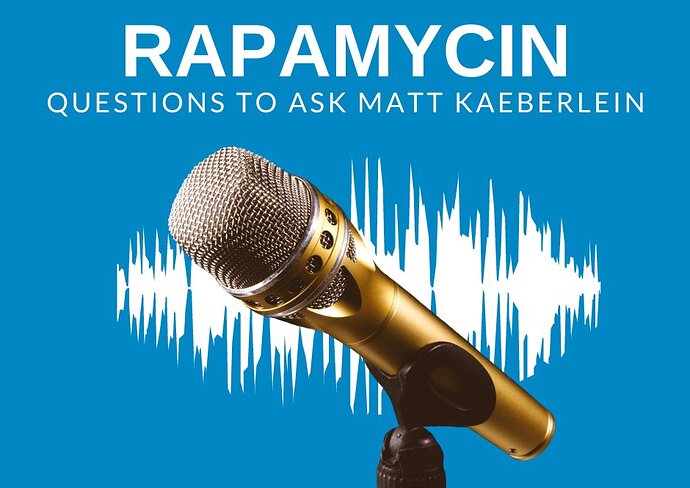This week I will interview the Rapamycin researcher Matt Kaeberlein for the podcast. Are there any questions you want me to ask him?
His opinion on that paper
![]() I wonder if the question could be reframed so it’s more easier to for a listener to take in the question. Any suggestions how to ask the questions without complicating things? Like “Is there any risks for people with type 2 diebetes to take rapamycin?”
I wonder if the question could be reframed so it’s more easier to for a listener to take in the question. Any suggestions how to ask the questions without complicating things? Like “Is there any risks for people with type 2 diebetes to take rapamycin?”
"Rapamycin Increases Mortality in db/db Mice, a Mouse Model of Type 2 Diabetes. Is this relevant for humans taking rapamycin for longevity? "
If he had to steelman the anti rapa camp, what is the most compelling reasons why NOT to take rapa?
Do we have any knowledge of rapa effect positive/negative on ckd and kidney function (kidney stones, since they seem to generally start in someone’s 30’s, so its probably somewhat age related)
Any ideas in terms of taking rapa for a period of time and then stopping, if that creates any long last changes
Any updates on optimal dose/frequency
generic vs rapamune
I really like the question about switching totally view and look at the weak points of Rapa ![]()
Does Matt have a list (or a link to a list) of veterinary medicines for dogs that might have a negative interaction with Rapamycin?
He has said previously that he considers everolimus to be equivalent to rapamycin. However they appear to be dosed differently. What dose of everolimus would be equivalent to rapamycin?
Can he talk a little about weekly vs. biweekly dosing, what are the benefits and drawbacks with each dosing strategy?
I would like to know whether he is using a rapalog in his dog study, and if yes, is this something he is developing as a potential product?
I don’t think its a rapalog he is using. But someone here probably can verify that.
The question as framed seems fine. If the listener can’t sit through Kaeberlein responding to a question about animal data, he or she shouldn’t be remotely thinking about any potential anti-aging effects of rapamycin, since that’s where all the data come from. Certainly they shouldn’t be considering using the stuff.
This.
(Apparently the forum software won’t let me post less than 20 characters).
He is using a formulated rapamycin product designed to be added to food developed by Trivium Vet. He doesn’t formulate drugs: he’s a biologist, not a medicinal chemist.
Can he see any benefits or negatives of taking a really high dose of Rapamycin once every 3-4 weeks? Somewhere between 20-40 mg-eq.
I’ve read that he cycles off rapamycin for weeks at a time. I’d like to know the rationale for that.
A question can be asked in many different ways like a answer can be done in many different ways. Some ways are very complex and hard to understand and other ways are more easier to understand etc. I like to strive to keep things simple and not to think that people know what I know. I remember that it was not that many years ago I didn’t understand terms like mTOR, AMPK, IGF-1 etc So I would really like to keep the podcast on a level which it’s easy to understand what we are talking about.
This is the second time I have heard about this approach this week. Have I missed something here. Is it someone who is proposing this regime?
People always talks about rapamycin being identified/discovered from bacteria in soil samples on Easter Island. What I’ve always wondered is does rapamycin occur naturally only on Easter Island, or is it more widespread across the globe, and nobody has looked for it/found it? Though, it may not matter now that it’s isolated and in drug form, but I’ve always been curious.
Alternatively, if anyone knows the answer, feel free to post it here.
I have wondered the same sometimes. I couldn’t find an answer but I could find that streptomyces species (streptomyces hygroscpoicus is the one that make rapamycin) make a lot of pharmacological compounds
(note that rapamycin isn’t even listed, so that list isn’t even complete)
Yes I think that’s part of what made me wonder about it. Streptomyces hygroscopicus seems widespread in nature, yet it was the Easter Island sample that had rapamycin.
